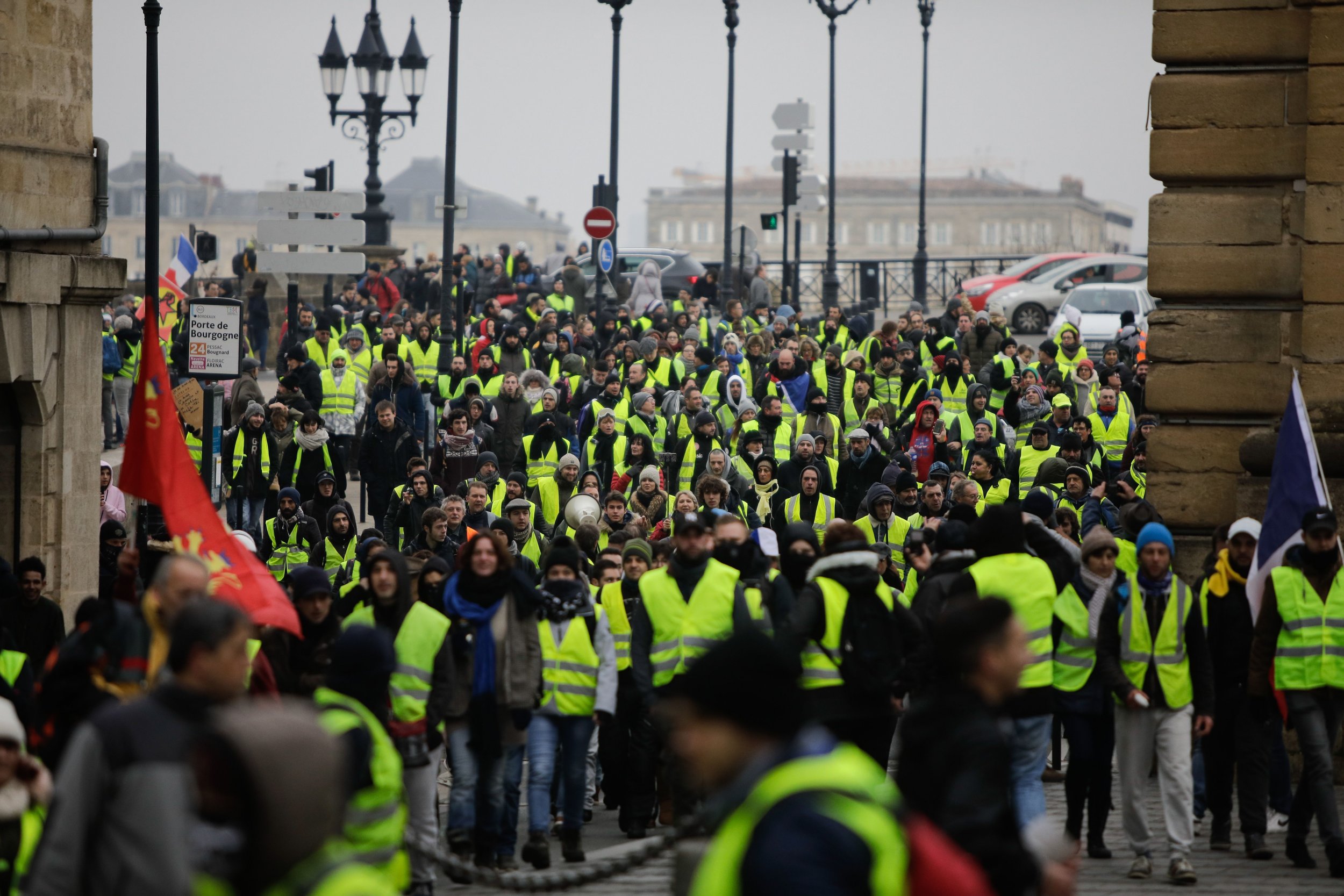
A German leftist leader has said her movement will mount street protests in 2019, inspired by the gilets jaunes (yellow vests) anti-government demonstrators who have brought France to a standstill in recent months.
Sahra Wagenknecht, the head of the Aufstehen (Get Up) movement, said the yellow vest demonstrations have shown that people can successfully lobby for political change without working from inside an established political party.
Related: France protests: Police threaten to join protesters, demand better pay and conditions
Speaking to the Foreign Press Association in Berlin on Wednesday, Wagenknecht said her movement—which has almost 170,000 signed-up members—is planning its own mass action for 2019 to try to change the German political landscape.
"We have big plans for next year, not least because we recognize when people go on to the streets to protest—especially those who have not had a political voice for many years who rediscover their voice by protesting—then political change can happen," Wagenknecht said, according to The Guardian.
Though she did not specify what form Get Up's action would take, she told reporters, "We will be visible on the street and in the public eye in 2019."
The yellow vest protests drew support from across the political spectrum. A decentralized movement, it has no appointed leaders and no detailed manifesto. The demonstrations began in response to a proposed fuel tax and later grew to demand the resignation of French President Emmanuel Macron and a host of economic reforms.
The demonstrations regularly descended into violent running battles with riot police, while internal fighting was reported between far-left and far-right protesters.
Arson and property destruction were common themes of the larger demonstrations, and parts of Paris and other cities were blanketed by tear gas and smoke at the peak of the action. At least 10 people have died in France since the protests began in mid-November.
Wagenknecht—who has risen to prominence through the left-wing Die Linke (The Left) party—distanced herself from the violence and assured the press she had no plans to encourage such behavior in Germany. Nonetheless, she voiced sympathy for those who felt the need to express their discontent through violent means.
"I'm clear that we don't want any violence, but at the same time you have to recognize that it is a clear expression of pent-up anger," she explained. "It doesn't just come out of nowhere."
She added, "I think it's completely wrong to reduce the yellow vest movement in France to violence. Of course there are those ready for violence amongst the protesters, but the movement is much broader than that."
Wagenknecht said discontent is festering among communities across Europe that feel they have been left behind and excluded from the benefits of globalization and the European Union.
Referring to Brexit, she said "social frustration" was a key driver for many Leave voters in the U.K. Wagenknecht spoke of "people working in former industrial areas where the already low wages have not risen," largely because companies can use cheaper migrant labor from Eastern Europe.
"The poorer half simply doesn't have access to the positive things in Europe," she said. "The freedom of movement, Erasmus, the possibility to find work in other countries—these are advantages that are only enjoyed by a small proportion of society." (The EU's Erasmus program allows students to study or work in a different European country.)
Anti-government protesters around the world have been donning yellow vests in recent months in solidarity with the gilets jaunes. Though such incidents have been small-scale, they are evidence of how potent a political symbol the item has become.
Anti-government protesters have been spotted wearing yellow vests in the U.K., Belgium, Italy, Canada, Iraq, Israel and Jordan, among other nations, according to The Guardian.
Foreign governments have kept a close eye on the French protests for fear they could spread. In Egypt, for example, the government has banned the sale of yellow vests throughout January in an effort to stifle any potential mass movement around this month's fifth anniversary of the 2013 Egyptian revolution.
Though copycat yellow-vest demonstrators have been spotted around the globe, so far there have been no protests comparable to those in France. But with 2019 threatening to be just as politically turbulent as 2018, that could change as anti-establishment movements consider how to make their voices heard.
Uncommon Knowledge
Newsweek is committed to challenging conventional wisdom and finding connections in the search for common ground.
Newsweek is committed to challenging conventional wisdom and finding connections in the search for common ground.
About the writer
David Brennan is Newsweek's Diplomatic Correspondent covering world politics and conflicts from London with a focus on NATO, the European ... Read more
To read how Newsweek uses AI as a newsroom tool, Click here.








